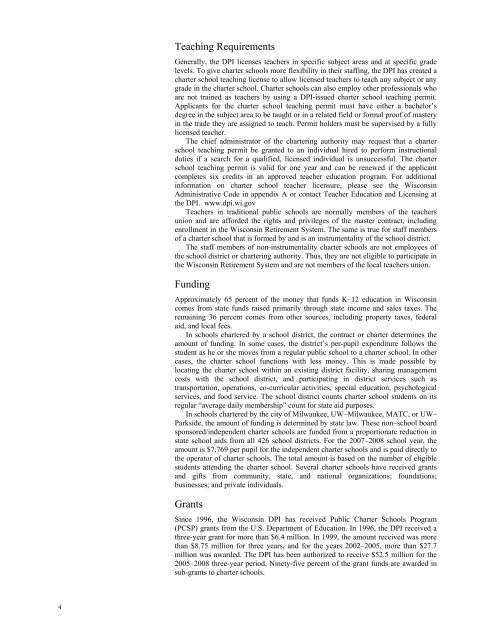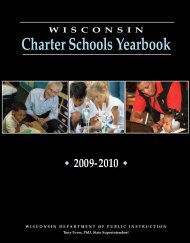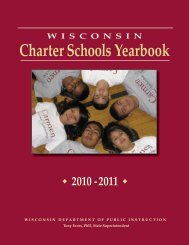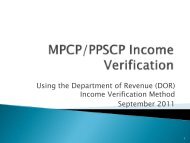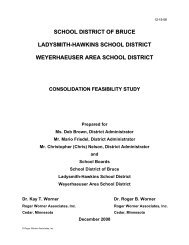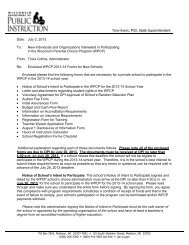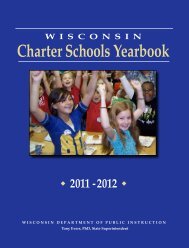Wisconsin Charter Schools Yearbook - School Management Services
Wisconsin Charter Schools Yearbook - School Management Services
Wisconsin Charter Schools Yearbook - School Management Services
Create successful ePaper yourself
Turn your PDF publications into a flip-book with our unique Google optimized e-Paper software.
4<br />
Teaching Requirements<br />
Generally, the DPI licenses teachers in specific subject areas and at specific grade<br />
levels. To give charter schools more flexibility in their staffing, the DPI has created a<br />
charter school teaching license to allow licensed teachers to teach any subject or any<br />
grade in the charter school. <strong>Charter</strong> schools can also employ other professionals who<br />
are not trained as teachers by using a DPI-issued charter school teaching permit.<br />
Applicants for the charter school teaching permit must have either a bachelor’s<br />
degree in the subject area to be taught or in a related field or formal proof of mastery<br />
in the trade they are assigned to teach. Permit holders must be supervised by a fully<br />
licensed teacher.<br />
The chief administrator of the chartering authority may request that a charter<br />
school teaching permit be granted to an individual hired to perform instructional<br />
duties if a search for a qualified, licensed individual is unsuccessful. The charter<br />
school teaching permit is valid for one year and can be renewed if the applicant<br />
completes six credits in an approved teacher education program. For additional<br />
information on charter school teacher licensure, please see the <strong>Wisconsin</strong><br />
Administrative Code in appendix A or contact Teacher Education and Licensing at<br />
the DPI. www.dpi.wi.gov<br />
Teachers in traditional public schools are normally members of the teachers<br />
union and are afforded the rights and privileges of the master contract, including<br />
enrollment in the <strong>Wisconsin</strong> Retirement System. The same is true for staff members<br />
of a charter school that is formed by and is an instrumentality of the school district.<br />
The staff members of non-instrumentality charter schools are not employees of<br />
the school district or chartering authority. Thus, they are not eligible to participate in<br />
the <strong>Wisconsin</strong> Retirement System and are not members of the local teachers union.<br />
Funding<br />
Approximately 65 percent of the money that funds K–12 education in <strong>Wisconsin</strong><br />
comes from state funds raised primarily through state income and sales taxes. The<br />
remaining 36 percent comes from other sources, including property taxes, federal<br />
aid, and local fees.<br />
In schools chartered by a school district, the contract or charter determines the<br />
amount of funding. In some cases, the district’s per-pupil expenditure follows the<br />
student as he or she moves from a regular public school to a charter school. In other<br />
cases, the charter school functions with less money. This is made possible by<br />
locating the charter school within an existing district facility, sharing management<br />
costs with the school district, and participating in district services such as<br />
transportation, operations, co-curricular activities, special education, psychological<br />
services, and food service. The school district counts charter school students on its<br />
regular “average daily membership” count for state aid purposes.<br />
In schools chartered by the city of Milwaukee, UW–Milwaukee, MATC, or UW–<br />
Parkside, the amount of funding is determined by state law. These non–school board<br />
sponsored/independent charter schools are funded from a proportionate reduction in<br />
state school aids from all 426 school districts. For the 2007–2008 school year, the<br />
amount is $7,769 per pupil for the independent charter schools and is paid directly to<br />
the operator of charter schools. The total amount is based on the number of eligible<br />
students attending the charter school. Several charter schools have received grants<br />
and gifts from community, state, and national organizations; foundations;<br />
businesses; and private individuals.<br />
Grants<br />
Since 1996, the <strong>Wisconsin</strong> DPI has received Public <strong>Charter</strong> <strong><strong>School</strong>s</strong> Program<br />
(PCSP) grants from the U.S. Department of Education. In 1996, the DPI received a<br />
three-year grant for more than $6.4 million. In 1999, the amount received was more<br />
than $8.75 million for three years, and for the years 2002–2005, more than $27.7<br />
million was awarded. The DPI has been authorized to receive $52.5 million for the<br />
2005–2008 three-year period. Ninety-five percent of the grant funds are awarded in<br />
sub-grants to charter schools.


